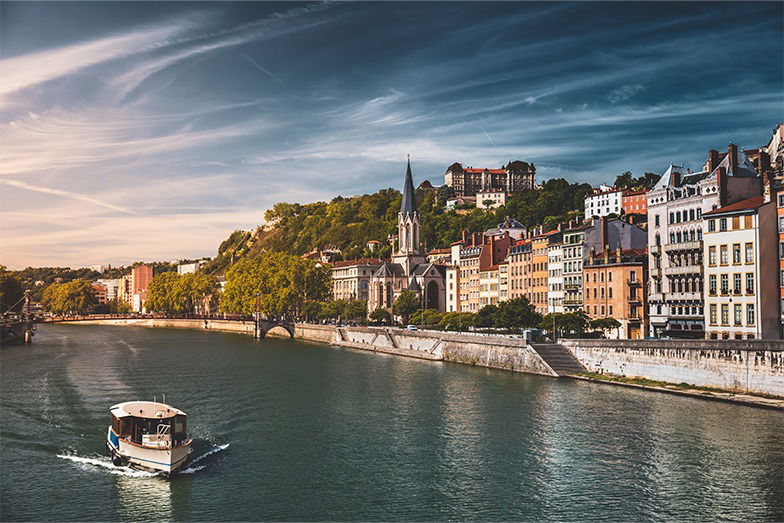Index
Getting started: Some facts about Lyon
Lyon museums & historical sites in Lyon
Practical information about Lyon
Getting started: Facts about Lyon
Lyon was included on the UNESCO World Heritage List in 1998 due to its “Outstanding Universal Value”, which includes the city’s stellar preservation of its architectural heritage and history.
- Lyon consists of nine municipal arrondissements.
- Most of the town’s historical sites are in the 5th arrondissement.
- Spring and summer are the most popular times to visit Lyon. While the winter months are usually cold, it’s worth braving the weather for the four-day Festival of Lights in Lyon, which starts on December 8.
- Lyon was considered the capital of the silk trade, and this heritage is evident throughout the city.
Places to visit in Lyon

Fourvière
Reached via funicular and offering panoramic views of the city, the hilltop Fourvière district is home to the Basilica Notre Dame de Fourvière as well as a number of other religious buildings – hence it is also known as ‘the hill that prays’. Also in the district is the Tour Métallique de Fourvière, erected to resemble the Eiffel Tower and now used as a television tower. Opposite Fourvière is La Croix-Rousse, known as the ‘the hill that works’ .
Croix Rousse
Silk weaving, once the city’s most prominent trade and source of income, was mainly conducted in the hilltop La Croix-Rousse neighborhood, hence its nickname. Many of the area’s buildings have distinct architectural features due to their use as silk workshops; as well, some of the original dwellings for workers in the silk industry still exist, as do covered passageways used by silk merchants and laborers. While many of the passageways have passed into private use, others can be seen via guided tours.
Lyon museums & historic sites in Lyon

Basilica of Notre Dame de Fourviere
The magnificent Basilica Notre Dame de Fourvière is said to resemble an upside-down elephant. Erected in the late 1800s, the Romanesque- and Byzantine-style structure is considered a symbol of Lyon and features a Museum of Sacred Art. The site also has splendid views of the city and surrounding countryside.
Vieux Lyon (Old Lyon)
Vieux Lyon, on the UNESCO World Cultural Heritage List, features narrow streets characteristic of medieval towns, as well as boutique shops and cozy bouchon-style restaurants.
Les Halles de Lyon – Paul Bocuse
Opened in 1859, Lyon’s first covered market is in the city’s 3rd arrondissement. Named in honor of the famous chef Paul Bocuse, Les Halles de Lyon is home to 56 traders, including cheese and chocolate makers, bakers and pastry chefs, butchers, fishmongers and wine merchant as well as delicatessens, caterers and restaurateurs.
Musée Cinéma et Miniature
Set on the main street of Vieux Lyon, the Cinema and Miniature Museum features exhibits related to film sets and special effects, as well as a collection of miniature scenes created by different miniaturist artists from around the world. The first and second floors of the museum are free to enter; the third floor requires a ticket.
Le Petit Musée fantastique de Guignol (The Little Guignol Museum)
The famous Guignol puppet character was created in 1808 by a silk trader, Laurent Mourguet. Allegedly Mourgeut turned to dentistry during the downturn of the silk industry and used puppet shows to attract patients. The puppet is considered a symbol of Lyon and many of Mourguet’s descendants were also puppeteers. The museum features quirky exhibits on the history of Guignol and other puppet characters.
Shopping in Lyon

You can visit the following addresses to shop in Lyon.
- Rue de la République for stylish shops and high fashion stores
- Bellecour Square and more for slightly more mainstream and modest shops
- The Old Town for intimate boutique shops
Dining in Lyon

Lyon is known for its bouchons, which are casual, often family-owned, restaurants with hearty regional dishes. These establishments originally catered to silk workers.
- On weekdays, especially at noon, many of the bouchons offer daily menus – meals usually consist of a soup or an appetizer, a main dish, a cheese and a dessert. Along with dishes such as coq au vin and grilled fish, pork and offal – found in sausages and other dishes – figure prominently.
- For a classic fine-dining experience, the Michelin-starred L’Auberge du Pont de Collonges, also known as Paul Bocuse after its former chef, is worth a visit.
- A traditional Lyonnaise dish is the quenelle, which is a type of dumpling, consisting of fresh moist breadcrumbs, butter, egg yolks and minced poultry, meat or fish – in Lyon, the pike quenelle is a particular favorite.
Getting around Lyon

Getting to the city from Lyon-Saint Exupéry Airport
Lyon-Saint Exupéry Airport is 30 km from the city center, which can be reached by the Rhône Express tram (about a 30-minute trip to the city center). From the Terminal 1 Departures area, the no. 47 public bus operates to the Meyzieu area (about 15 minutes). From here, it’s about a 30-minute trip on the T3 tram to the city center.
Getting around Lyon
Lyon’s transportation network includes the metro, buses, trams and funiculars. Bicycles are available at bike stations throughout the city.
Practical information about Lyon
Important Phones
Official language: French
Currency: Euro (EUR)
Socket type: E
Important Phones
Area Code: +33
Emergency Assistance: 112
Consulate General of the Republic of Türkiye in Lyon: +33 (0) 4 72 83 98 40

